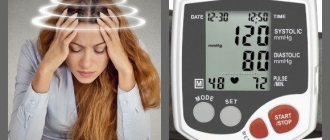There are extremely many reasons for this. A long list of diseases, some actions of the person himself, and possibly influences on him can cause fainting. It’s even difficult to list all the diseases and causes (provoking factors). Here are some of them: congenital heart defects - again, some, not all. For example, defects of the aortic valve, aorta, pulmonary artery. Heart rhythm disturbances are very different: both a sharp increase in heart rate (tachycardia) and a significant slowdown in the heart rate (bradycardia) - various heart blocks. A sudden change in body position from horizontal to vertical or prolonged standing (especially in a stuffy room) causes so-called orthostatic collapse, or syncope. Hypoxia (acute lack of oxygen), severe anemia (low hemoglobin) and many, many other reasons can cause loss of consciousness. But the most common are so-called vascular syncope.
When your head is spinning
Dizziness is a rather unpleasant condition in which a person, who is in a motionless state, feels the rotation of surrounding objects around him. This phenomenon is reminiscent of riding a carousel. In medicine, dizziness is called vertigo.
Most often, dizziness is not dangerous for a person. It occurs in response to harmless factors. After eliminating them, the unpleasant sensation completely disappears. But sometimes vertigo can signal serious pathologies that require proper and timely treatment.
Mechanism of development of vertigo
If we consider dizziness from an anatomical point of view, the causes of this condition are quite simple. The vestibular apparatus, responsible for human balance and coordination in space, is located in the inner ear. Vision and muscle reflexes help a person navigate the environment. All received information enters the brain. And it is he who controls the functioning of the vestibular apparatus.
Sometimes the connection between the inner ear and the brain can become disrupted. A person loses the ability to navigate in space. Dizziness appears. To restore the lost connection, the brain immediately launches several reactions at once. Some of them may affect neighboring centers (for example, emetic). This leads to the appearance of unpleasant accompanying symptoms.
What causes you to faint during or after dizziness?
If you often feel dizzy and experience frequent fainting, you should not delay visiting a doctor. Often additional symptoms include nausea and vomiting, darkening of the eyes, general weakness in the limbs, etc. The main causes can be conditionally divided into 2 groups depending on the symptoms: neurogenic and somatogenic cases.
Most often, dizziness followed by fainting occurs due to:
- pathologies of the nervous system;
- hemorrhages inside the brain;
- epilepsy;
- thrombosis;
- atherosclerosis in a progressive form;
- complications after traumatic brain injury;
- sudden changes in blood pressure;
- hypoglycemia or low sugar levels;
- poisoning of the body of an exogenous nature;
- taking certain medications;
- alcohol and drug abuse;
- tumors in the brain area;
- infectious lesions;
- heart diseases;
- hydrocephalus or intracavitary fluid accumulation in the brain;
- anemia.
Also, such signs do not always indicate dangerous diseases and pathologies. Very often, dizziness occurs during menstruation, pregnancy and menopause, or at retirement age due to age-related changes. Various hormonal changes can lead to a woman experiencing weakness, dizziness, frequent nausea, possible fainting, tinnitus, etc.
Another reason why a person faints is an increased level of carotenoid sinus sensitivity. Visually, such people can easily be identified by their characteristic habits: they have a negative attitude towards narrow collars and tight ties.
Even slight compression of the neck and chest area leads to dizziness and possible loss of consciousness.
Sudden dizziness: 5 simple reasons
Typically, loss of communication between the brain and the vestibular system is rare and does not last long.
Dizziness that occurs is not considered a pathology in the following cases:
- Riding on a carousel . Such entertainment creates a serious load on the vestibular apparatus. And if it is naturally weak and untrained, then it may well fail. Such dizziness usually occurs in women, since they also have psycho-emotional experiences added to the load.
- Stress, worries . If dizziness occurs during a speech in front of a large audience or after a reprimand from a boss, then the cause of vertigo is the production of a large amount of adrenaline. This hormone causes vasospasm. And this leads to a temporary deterioration in blood flow in the brain.
- Climbing to heights . In this case, the unpleasant phenomenon is also considered a physiological norm. When rising to a height, a person’s eyes cannot quickly focus on distant and close objects. Abrupt switching between objects causes dizziness.
- Hunger . Similar problems are common to all fans of strict diets. If a person does not receive enough nutrition, then a glucose deficiency occurs in his body. The absence of the main “fuel” leads to deterioration of brain function and the appearance of dizziness.
- Active exercises . Exercise enthusiasts should remember moderation. Excessive exercise can cause low blood pressure. This leads to dizziness and sometimes fainting. The unpleasant condition may be caused by unsuccessful sudden movements of the head, as a result of which the blood supply to the brain is disrupted.
An attack of dizziness may occur in response to taking certain medications. The most common sources of unpleasant symptoms are NSAIDs, antidepressants, antibiotics, and cancer medications. If your head is “turned” by medications, be sure to consult a doctor to change the drug.
Symptoms of manifestation
People with a developing disease move poorly, are unsure, lack balance, appear distracted, and have impaired articulation. When trying to draw a figure, for example, a circle, in the air, the patient ends up with a zigzag or broken line.
One method of testing coordination is a test where the patient is asked to touch his nose. If the disease develops, a person cannot perform the assigned task normally. The patient gets it either in the mouth or in the eye. Negative changes are also visible in the handwriting: the letters are written unevenly, creep on top of each other, and jump along the line. These signs indicate neurological problems.
Severe dizziness: 6 pathological causes
The causes of dizziness are not always harmless. Sometimes illnesses become sources of unpleasant conditions. In this case, dizziness occurs quite often and can last longer than a few seconds. To cope with this phenomenon, you need to consult a doctor. The severity of a symptom can be reduced (and sometimes completely eliminated) only through proper treatment of the underlying disease.
So, the causes of dizziness may include the following pathologies:
- Vegetovascular dystonia (VSD) . A complex disorder in which a person experiences multiple impairments. All these symptoms are associated with malfunctions of the autonomic system. One of the common signs of VSD is dizziness. Such attacks are usually caused by sudden movements and rapid changes in posture. Dizziness does not last long. They go away on their own, without any intervention.
- Disorders in the cervical spine . Various injuries, osteochondrosis, intervertebral hernias can periodically remind you of themselves with sudden attacks of dizziness. They usually appear after active neck movements. The attack is accompanied by pain in the affected area, sometimes a crunching or crackling sound is heard.
- Anemia . Dizziness may occur due to iron deficiency. Most often this pathology is observed in children and women. With anemia, attacks are accompanied by high fatigue, weakness, pale skin, and pre-fainting conditions.
- Psychogenic dizziness . The reason for this pathology lies in the patient’s increased anxiety (people with an unstable psyche) or in the stress they have endured. Such people usually complain of poor sleep, fear of losing consciousness, a periodic feeling of shortness of breath, and increased heart rate.
- Vertebrobasilar insufficiency . This is a pathology in which blood flow in the vertebral or basilar arteries is weakened. Such problems lead to disruption of brain function. The pathology is characterized by regular attacks of dizziness, which can last up to an hour. In addition, patients complain of nausea, vomiting, and visual disturbances may occur. I often have a headache.
- Hypotension . A decrease in blood pressure is often accompanied by attacks of dizziness. Sometimes lightheadedness may occur.
Alcohol intoxication, dehydration, and overheating of the body can cause dizziness. The unpleasant phenomenon may be caused by vision problems or ear infections.
Decreased vision and dizziness: what diseases are signaled - all about vision
Visual disability: criteria, degrees, when assigned.
What orthokeratology is and the specifics of using night lenses are described in detail in this article.
In general, although accommodation spasm is a rather complex and dangerous problem, if desired, it can not only be effectively avoided using conventional prevention methods, but also treated quite successfully.
To do this, it is enough to pay attention to the problem in a timely manner and, at the first pronounced symptoms, consult a doctor for qualified help. He will help you deal with this trouble in a short time. Otherwise, the field of view will narrow, which can lead to loss of visual acuity.
This behavior of the visual system can cause farsightedness and myopia.
The inability to focus your gaze on close or distant objects is the so-called blurred vision. The brain does not receive a clear picture.
You might immediately think that the pathology is concentrated in the eye apparatus.
This is often true, however, in addition to eye diseases, the inability to concentrate the gaze occurs with neurological ailments, taking certain medications, cancer and other diseases.
In the picture you should see a panda
What reasons become the culprits of such a pathology as the inability to concentrate the gaze and disrupt normal, clear vision?
Firstly, these are anomalies of accommodation (the ability of the eye to quickly adjust the image when moving the gaze, for example, from a close to a distant object and vice versa).
Acute defocus occurs with eye diseases such as retinal detachment, lens luxation, injuries or hemorrhages into the vitreous body.
Secondly, diseases for which the eye doctor refers the patient to other specialized specialists: a neurologist, oncologist, infectious disease specialist.
The reasons for defocusing the gaze and the inability to concentrate the gaze are as follows:
- pathology of the optic nerve;
- brain tumors (including the optic nerve);
- metastasis from other organs;
- infectious diseases (flu, tuberculosis, tonsillitis, typhus);
- blood diseases;
- kidney diseases;
- encephalitis;
- vascular pathology;
- metabolic disease;
- poisoning;
- taking certain medications;
- inflammation of the sinuses;
- various mental disorders (neuroses, etc.).
Normally, accommodation depends on the elasticity of the lens. In childhood, elasticity is high, and with age various disorders appear. Myopia sometimes develops in schoolchildren, when the student cannot concentrate his gaze on a distant object.
Farsightedness usually appears after 40 years of age; it is also called “age-related”. In this case, nearby objects blur.
At 70 years of age, the elasticity of the lens is so low that normal focusing without glasses correction is almost impossible.
In young people, spasm of accommodation is more common, mainly due to overexertion, when they spend too much time at the computer or preparing for exams (stress is also involved, which also affects the ability to concentrate).
Symptoms of accommodation spasm are as follows: patients complain of pain in the eyes, burning and redness. Working close is painful. Children get tired quickly, almost all have headaches.
It is impossible to focus your gaze on distant objects; nearby objects can also “blurry.” Double vision is also not uncommon.
When the optic nerve is dysfunctional, paralysis or paresis of accommodation occurs. This manifests itself in the inability to see small objects (paresis) or the far point of clear vision merges with the near one (paralysis).
When diagnostic measures have revealed that the cause is solely an eye disease, the first step is to establish a sleep and rest routine and reduce the load on the visual system.
Be sure to maintain the optimal distance to a book or computer, and also select a table and chair strictly according to height so that the person does not slouch. If necessary, correction is prescribed (contact lenses or glasses).
Physiotherapeutic procedures include exercises to strengthen the muscles of the back and neck, measures to improve blood circulation in the eyes, special “eye gymnastics,” as well as hardware (transcranial, myostimulation, interference). Massage of the cervical-collar area helps a lot.
If vision decreases due to a tumor, the patient is sent to an oncologist, where treatment is performed: radiation, chemotherapy, or a comprehensive approach, including surgery.
For other diseases, the underlying ailment is treated. For example, inflammation of the sinuses requires both medication (antibiotics) and physical therapy. Microwave and UHF electromagnetic waves perfectly treat even acute sinusitis.
Diadynamic currents and electrophoresis with individually selected drugs have proven themselves to be effective.
Damage to the optic nerve is treated by a neurologist. This is a very serious pathology called nerve atrophy (death).
In addition to vasodilators and anticoagulants, vision is also saved with the help of hormones, vitamins, and physical therapy: electrical stimulation of the optic nerve. Laser and magnetic stimulation and acupuncture have beneficial effects.
With proper treatment in the initial stages of many diseases, blurred vision can be eliminated and clear vision can be restored.
Older patients, especially those with vascular problems, need to be on their guard, because increased intraocular pressure without treatment leads to the death of the optic nerve and blindness.
Risk factors include the eye and body diseases listed above, improper daily routine, sedentary lifestyle, high blood pressure (arterial and intraocular).
Therefore, if you notice that your vision is losing clarity, immediately make an appointment with an ophthalmologist or neurologist.
anonymous, Male, 20 years old
Greetings. The problems started about a month ago. It all started with an emotional shock, followed by an “attack” (for a minute I felt numbness, first in my temples, then my forehead, cheeks, and nose progressively, and quickly passed). I went straight to the therapist, he said that it was overwork, he recommended taking a break from physical activity (before that I had been for 4.
5 I was engaged in bodybuilding, almost without breaks), sent for blood tests and an ecg. It was Friday. Over the weekend, I was accompanied by the following symptoms: dizziness (when walking, it is reflected in an uneven course of movement, with a static position of the head, a feeling of rotation of the head in a circle with a small diameter). Vision has changed.
The image floats, moves, deforms, more often when focusing, less often just like that. This also happens with your eyes closed. Clarity decreased and focusing began to take longer. Periodic ringing in the ears. It was difficult to control emotions. Frequent panic attacks. As a result of this, I quit smoking and have not smoked for a month now.
Then I donated blood and had an ECG, they were fine. I went to the first neurologist. Based on the symptoms described, she made a preliminary diagnosis of “multiple sclerosis” and ordered an MRI to confirm. MRI conclusion: MRI picture of single small periventricular focal changes in the frontal lobes. MRI control is recommended. The diagnosis was not confirmed.
She prescribed an X-ray of the neck, and I took and injected vascular drugs (Aertal, Mydocalm-Richter, Cortexin, Milgamma (after the injections, the symptoms worsened)) for 10 days. X-ray showed grade 2 osteochondrosis and Kimerli anomaly. During this time, I also went to an ophthalmologist due to deteriorating vision, but he did not reveal anything, attributing it to vascular treatment.
The next step was to go to a second neurologist, who said that I was healthy and advised me to go to a psychotherapist. After 10 days of treatment, I went back to the first neurologist for an appointment, she said that you are healthy, you can go to another doctor. After it, I immediately went to a psychotherapist, he advised me to go to a male neurologist he knew with extensive experience.
I went to see him, and at first he also said that I was healthy, but then he suspected hypothyroidism. I passed the TSH test, the result was 5.52 (Slightly above the norm 0.27-4.20). The doctor referred me to an endocrinologist. The endocrinologist ordered tests on the thyroid gland, they are normal, except for the TSH. I was diagnosed with subclinical hypothyroidism, which does not cause the symptoms I have now.
And it is as follows: when I am concentrated on something, even sometimes just like that, when I turn my gaze to something else, this transition is slow, inhibited, and I get lost for a second. The same story applies to the position of the body in space. Pain in the head, pressing, mainly in the temples, less often in the back of the head and neck. Peripheral vision is more unfocused, especially noticeable in a confined space.
When focusing on something, the image begins to deform, float, distort, there is a feeling of movement (even with the eyes closed), midges or spots in front of the eyes. There is double vision, vision has lost its former clarity, memory loss, slight deterioration in speech. Even with minor physical
Under load - dizziness, all of the above symptoms intensify, breathing and heartbeat quicken, I hear the heartbeat (pulse) in my head, the feeling that the ground is leaving from under my feet. I don’t see any panic here. Constipation. Dry mouth and nose. The muscles often twitch and become numb. Yesterday my foot became numb while walking.
Problems with touch: perception lags in time from stimulation, the sensation of touch persists for a long time after the cessation of the stimulus. There are burning and tingling sensations. So, now I’ve returned from the endocrinologist, I don’t know what to do. Please specify the vector of movement, which doctor should I contact, and what is the problem? Thank you in advance.
Source:
VSD and vision: treatment of disorders, cause of vision problems, blurriness, deterioration
VSD and vision are closely related and are accompanied by fluctuations in blood pressure, the appearance of dark spots, and photophobia. The pathology is based on the patient’s experiences, feelings of anxiety and fear for his life. The disease causes a concentric narrowing of the visual field that occurs after a stressful situation.
Reason for changes in visual function
As a result of prolonged nervous tension, the patient develops increased anxiety. Negative emotions influence the occurrence of visual disturbances:
- anger;
- shame;
- resentment;
- guilt.
Sometimes the cause of poor vision is negative thinking. The patient constantly focuses on stressful situations.
Working at a computer for many hours every day causes visual impairment in VSD if the patient does not take breaks from work. Panic attacks are dangerous for the patient, causing the appearance of “floaters”, black spots, and fog before the eyes.
Mental and physical exhaustion, poor nutrition, and drug use affect the quality of vision. During a panic attack, a person cannot look at bright light and sees rainbow circles before his eyes.
Severe dizziness: 6 dangerous reasons
In some cases, vertigo signals the development of severe conditions that require immediate medical attention. Causes of severe dizziness may include:
- Labyrinthitis (internal otitis). A viral infection in the inner ear may be asymptomatic at first. The only sign of otitis media is dizziness, which lasts for several minutes. Such attacks are repeated quite often. In the future, the viral process can affect the nervous system or brain.
- Concussion . Sometimes after a head injury, only dizziness appears. This symptom should not be ignored. It serves as direct evidence of a concussion. To eliminate the risk of swelling or serious brain damage, you should immediately seek medical help.
- Stroke . If dizziness is accompanied by sudden weakness, complaints of numbness of a body part, visual impairment, speech disturbances, then the risk of stroke is high. This is a severe pathology in which blood circulation in the brain is disrupted.
- Migraine . Dizziness accompanied by a severe headache may indicate a migraine. Many people believe that this condition is harmless. But doctors say that migraine, especially in an advanced state, can lead to severe damage (sometimes even to a heart attack or stroke).
- Cardiovascular diseases . Such pathologies are characterized by the appearance of dizziness every time a person gets up. It is caused by a sharp decrease in pressure. Symptoms like these may indicate dehydration, which is causing your blood to thicken. But if the problem is not fluid deficiency, then it may be the development of arrhythmia or heart failure.
- Tumors . Regular attacks of vertigo combined with headaches, usually in one side of the head, can signal the development of a tumor in the brain.
Fainting: 8 signs of a serious problem
Fainting is caused by a temporary loss of blood supply to the brain and may be a sign of a more serious condition...
Temporary loss of consciousness - fainting
Fainting is a temporary loss of consciousness.
Fainting is caused by a temporary loss of blood supply to the brain and may be a sign of a more serious condition.
People of any age can faint, but older people may have more serious causes.
The most common causes of fainting are vasovagal (a sharp decrease in heart rate and blood pressure) and heart disease.
In most cases, the cause of fainting is unknown.
Subscribe to our INSTAGRAM account!
When to seek medical help?
Because fainting can be caused by a serious condition, all episodes of loss of consciousness should be taken seriously .
Anyone, even after the first episode of loss of consciousness, should consult a doctor as soon as possible.
Depending on what the physical examination reveals, your doctor may require tests.
These tests may include: blood tests; ECG, 24-hour monitoring, echocardiography, functional stress test. Table tilt test. This test checks how your body reacts to changes in position. Tests to detect nervous system problems (head CT scan, brain MRI or EEG).
If the person next to you faints, help him.
- Place it on the ground to minimize the chance of injury.
- Encourage the person actively and call an ambulance immediately if the person is unresponsive.
- Check your pulse and begin CPR if necessary.
- If the person is recovering, let him lie down until the ambulance arrives.
- Even if the cause of fainting is not dangerous, have the person lie down for 15-20 minutes before getting up.
- Ask him about any symptoms such as headache, back pain, chest pain, shortness of breath, abdominal pain, weakness or loss of function, because these may indicate life-threatening causes of fainting.
Treatment of fainting
Treatment for fainting depends on the diagnosis.
Vasovagal syncope. Drink plenty of water, increase your salt intake (under medical supervision), and avoid standing for long periods of time.
Orthostatic syncope. Change your lifestyle: Sit down and flex your calf muscles for a few minutes before getting out of bed. Stay hydrated.
Older adults with low blood pressure after meals should avoid large meals or plan to lie down for several hours after eating. In most cases, you should stop taking the medications that cause fainting (or change them).
Cardiac fainting. To treat cardiac syncope, the underlying condition must be treated.
Valvular heart disease often requires surgery, while arrhythmia can be treated with medications.
Medications and lifestyle changes.
These procedures are designed to optimize heart performance and control high blood pressure; in some cases, antiarrhythmic drugs may be prescribed.
Surgery: Bypass surgery or angioplasty is used to treat coronary artery disease; in some cases the valves may need to be replaced.
A pacemaker may be implanted to normalize the heart rate (slows the heart for fast arrhythmias or speeds up the heart for slow arrhythmias).
Implanted defibrillators are used to manage life-threatening rapid arrhythmias.
Preventing fainting
Preventive measures depend on the cause and severity of the fainting problem.
Fainting can sometimes be prevented by taking simple precautions.
- If you are weak due to the heat, cool down your body.
- If you faint while standing (after lying down), move slowly while standing. Slowly move to a sitting position and rest for a few minutes. When you are ready, stand up using slow and fluid movements.
In other cases, the causes of fainting may be subtle. Therefore, consult a doctor to determine the causes of fainting.
Once the cause is determined, treatment for the underlying disease should begin.
Cardiac syncope: Because of the high risk of death from cardiac syncope, people who experience it should be treated for their underlying illness.
Periodic fainting. Consult a doctor to determine the reasons for frequent loss of consciousness.
Prognosis due to fainting
The prognosis for a person who has fainted depends largely on the cause, the patient's age, and available treatments.
- Cardiac syncope has the greatest risk of sudden death, especially in older people.
- Fainting, which is not associated with cardiac or neurological disease, represents a more limited risk than in the general population.
Checking the pulse in the neck area. The pulse can be clearly felt only near the throat (trachea).
If the pulse is felt, notice whether it is regular and count the number of beats in 15 seconds.
To determine your heart rate (beats per minute), multiply this number by 4.
The normal heart rate for adults is between 60 and 100 beats per minute.
If fainting happened just once, then you don’t have to worry about it.
It is important to see a doctor because fainting can have serious causes.
Fainting may be a sign of a serious problem if:
1) it often occurs over a short period of time.
2) it occurs during exercise or vigorous activity.
3) fainting occurs without warning or in a supine position. When fainting is not serious, the person often knows it is about to happen and vomits or feels sick.
4) a person loses a lot of blood. This may include internal bleeding.
5) shortness of breath is noted.
6) chest pain is noted.
7) a person feels that his heart is pounding (palpitations).


If you have any questions, ask them here
The materials are for informational purposes only. Remember, self-medication is life-threatening; consult a doctor for advice on the use of any medications and treatment methods.
PS And remember, just by changing your consumption, we are changing the world together! © econet
Source: https://econet.ru/articles/182586-obmorok-8-priznakov-serieznoy-problemy
What to do?
It is almost impossible to independently determine the causes of frequent attacks of dizziness. Therefore, those who regularly experience vertigo are advised to go to an appointment with a therapist, or a neurologist. The specialist will carefully examine the patient’s complaints and prescribe diagnostic tests. If necessary, the doctor will refer the patient for consultations with an ENT specialist, an ophthalmologist, a cardiologist, or an endocrinologist.
To identify the causes of vertigo, the patient may be prescribed the following tests:
- Neurological tests . They allow you to assess the functionality of the vestibular apparatus.
- MRI or CT . Such brain studies reveal various disorders (hemorrhages, tumors, vascular pathologies).
- Ultrasound Doppler . Using Doppler ultrasound, the condition of the vessels of the head and neck is studied.
- Audiometry . Diagnostics allows us to assess hearing function.
- EEG . To study the activity of the cerebral cortex, the doctor will prescribe electroencephalography.
To quickly cope with dizziness (of course, if it is not caused by dangerous reasons), you can sit on any surface, relax a little and take 5-6 deep breaths. Be sure to open the window (if you are indoors) to provide fresh air. If the causes of vertigo are harmless, then such actions are quite enough for the dizziness to disappear without a trace.
Treatment
Treatment of dizziness and hot flashes (throws you into a fever) is very difficult. If the problem occurs during menopause, a temporary solution is the use of female hormones.
Important! Hormones cannot be used long term because hormone therapy increases the risk of breast cancer or other diseases.
If the problem is associated with increased activity of the thyroid gland, treatment with substances that normalize the production of hormones can be used.
If hot flashes are caused by food, it is recommended to avoid risky foods.
In the case of cancer, there are few therapeutic options; you need to wait until the symptoms disappear.
Traditional medicine for hot flashes recommends drinking tea from yarrow or sage.






